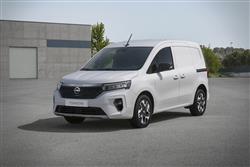Nissan Townstar EV - ABC Leasing
How will you view?
This is a sample, showing 30 seconds of each section.
TOWN TIME(some text hidden)
By Jonathan Crouch
Ten Second Review word count: 33
In full-electric form, Nissan's Townstar small LCV offers all the attributes of an electric Renault Kangoo or Mercedes Citan van, but with a longer five year warranty. Which makes it a strong contender.
Background word count: 132
It's almost forgotten now that Nissan were amongst the innovators in the field of electric vans. Think of a trend-setting small full-battery-powered LCV and it's the Renault Kangoo Z.E. of 2011 that tends to spring to mind. But Renault's partner Nissan used the same drivetrain in an e-NV200 model that appeared shortly afterwards and sold spectacularly for the Japanese brand. That model's replacement was this contender, Nissan's Townstar EV, a far more modern and usable take on what a small electric van should be. Like its predecessor, it shares all its drive technology with the electric Renault Kangoo, but this time round, that technology allows for a far greater driving range, swifter performance and faster charging. Sounds promising. To find our more, you'll need the usual complete Car and Driving Road Test.
Driving Experience word count: 407
The Townstar's EV powertrain is lifted straight from the Renault Kangoo E-Tech (and the Mercedes eCitan). Which means you get a 45kWh battery powered by an electric motor producing 122PS and 245Nm of torque. When fully charged, this variant can offer up to 183 miles of range. That's an improvement of around 45% over the old e-NV200. The electric Townstar combines intelligent energy management and effective battery thermal cooling in one package, but bear in mind that you've to engage a rather restrictive 'Eco' mode to get close to achieving the quoted range. In terms of ride quality, this EV Townstar fares a little better than its combustion counterpart, thanks to the weight of the battery pack mounted beneath this van's CMF-CD platform. That also helps handling around the twisty stuff, where this Nissan feels a little more engaging to punt around than its Stellantis Group rivals. Impressively, the braked towing weight figure (1,500kgs) isn't affected by a switch to this EV powertrain. The Townstar EV has three provided levels of selectable regenerative braking: you knock the gear lever to the right, then move it up and down to move between the settings, 'B2' being the default one. On the highway, you should shift the big gear selector into the 'B1' 'Sailing' setting, which limits energy harvesting to the minimum for unimpeded cruising. In town meanwhile, you'd activate the fiercest 'B3' 'Brake' setting, which slows the van noticeably off-throttle, though not to the extent you'd get from the 'e-Pedal' system championed by some of Nissan's other electrified models. As with the petrol Townstar, there's also an Eco mode to stifle the throttle and maximise range, but in the EV version, it muffles power output more considerably, reducing it by half to just 60hp, so you won't really want to engage it outside the city limits unless you really are running low on charge. As for refinement, well there's a bit of wind noise at higher speeds and some electric motor whine under hard acceleration, but overall, it's a little better than rival Vauxhall, Peugeot, Citroen and Fiat EV van models. The cabin's a little less boomy than it is with those rivals, presumably because of extra sound-deadening. At town speeds, the legislation-required artificial sound effects kick in to warn unwary or disabled pedestrians of your approach: Nissan has installed the 'Canto' sound it developed for its passenger cars, which pulses more loudly when this Townstar is reversing.
Pictures (High res disabled)

.jpg)
.jpg)
.jpg)
.jpg)
white.jpg)
Scoring
Category: Compact Car
| Performance | |
| Handling | |
| Comfort | |
| Space | |
| Styling | |
| Build | |
| Value | |
| Equipment | |
| Economy | 80% |
| Depreciation | 60% |
| Insurance | 70% |
| Total | 68% |